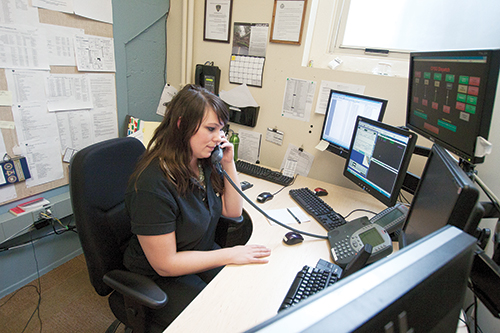
Campus Public Safety Office Dispatcher Bonnie Jensen comes from a law enforcement family: Her father was a police officer and detective with the Ashland, Ore., Police Department and her uncle worked at the FBI office in Portland.
While earning her bachelor’s degree in criminal justice at Portland State, Jensen worked as a work-study receptionist for CPSO as well as handled lost and found items. When she graduated last year, she was offered a full time job dispatching with CPSO.
Jensen jumped at the chance.
“I have the disposition for it—I’m a people pleaser,” Jensen said. “I enjoy being friendly on the phone and helping people.”
CPSO’s dispatchers are responsible for receiving all the phone calls that come to CPSO, including CPSO’s emergency lines. The calls range from people looking for a phone number for a certain department at PSU to calls of crimes in progress to requests for escorts at late hours.
CPSO employs five full-time dispatchers and a communications and records supervisor, who staff the dispatch office 24 hours a day, seven days a week. They work four 10-hour shifts a week and work day, afternoon or swing shifts, as well as overnight or graveyard shifts.
As part of their training, they are required to complete a two-week telecommunicator course at the police academy in Salem, along with a minimum of four weeks of on-the-job training.
Dispatcher Tyler Roppe, who has been working with CPSO since 2008 and has a bachelor’s degree in political science and communication development and a master’s degree in education, said he enjoys being able to see the resolution of most calls at CPSO.
“There’s more investment in the calls here, and it’s nice to do dispatch and call-taking and handle the entire call [that way],” Roppe said
They also monitor elevator alarms, panic alarms and buildings with secure access at PSU through a notification system called Lenel.
They have a CAD (computer-aided dispatch) system into which they enter the calls they receive based on the type of call it is—such as an open door, an alarm, or a crime such as a theft or a hit and run.
An officer is then assigned to the call and notified, and then the dispatcher will type in a narrative for the call, describing what is occurring. When the officer has completed the call, the dispatcher categorizes the incident and clears the office from the call.
If it’s busy and the officers have more than one call to respond to, these calls are listed in the CAD system in order of importance, which is determined based on the type of call it is.
“That’s one of the reasons I like being here, it makes things more personable for the students reporting a crime,” Jensen said. “Through the officers, I’m able to help put the students in touch with different resources available to them.”
While they do not dispatch fire or medical personnel, dispatch is able to very quickly connect the caller with those resources or call the appropriate agency.
CPSO’s dispatch staff works with the Portland Police Bureau and the Portland Fire Department when response to an emergency situation is needed.
The dispatchers monitor three radio lines, including PPB’s channel. To assist the officers in obtaining information necessary to investigate calls, the dispatchers are able to run driver’s licenses and license plates through the Law Enforcement Data System and check for information through a PSU database, where they can search by a student’s ID number, name or employment status to find information such as a student’s class schedule.
Dispatchers also have access to PPB’s CAD system, called Portland Police Data System, which will show them any prior contacts a person has had with PPB, from an arrest to being a victim of a crime.
“I like when I get to do more investigative stuff and help the officers with calls that way,” Jensen said.
Jensen has thought of going to the patrol side of CPSO but said she prefers dispatch for now. Becoming a dispatcher at a 911 center has also crossed her mind.
“Going to a 911 agency would interest me, because I would be able to handle the more serious calls from start to finish instead of having to transfer them to someone else,” she said.
The dispatch office was moved in 2012 from the basement of the Fourth Avenue Building to the CPSO headquarters in Shattuck Hall, which makes for easier dialogue and interaction with the patrol officers on calls, Jensen said.
Patrol Sergeant Joe Schilling agrees that being closer and able to interact with the dispatchers is a positive change.
“It’s very conducive to other staff and officers being able to help in case a major [crime] event occurs. It allows a good marshaling place for more personnel.”
CPSO dispatch’s website is pdx.edu/cpso/campus-dispatch.

